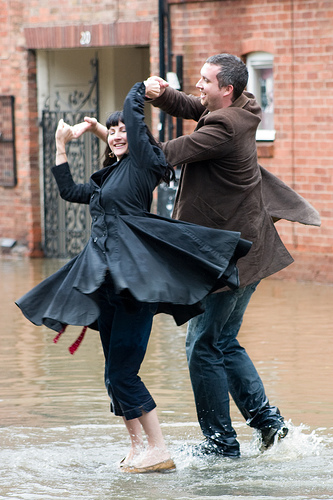Published: March 18, 2014

© Istockphoto
In a large population-based cohort study, researchers have found a link between poor cardiovascular fitness and low cognitive performance at age 18 and the later onset of dementia. The study’s lead researcher was Jenny Nyberg, Ph.D., of Sweden’s University of Gothenburg. Results appear in the new issue of Brain.
The study included more than 1 million Swedish men. At age 18, they underwent mental and physical exams as part of their military conscription. These men were then followed up for up to 42 years to see which ones developed early-onset dementia. The researchers then used the data to see whether there was an association between cardiovascular and cognitive fitness at age 18 and early-onset dementia.
The researchers found that such an association did exist. Both low cardiovascular and cognitive performance in early adulthood were associated with an increased risk for future early-onset dementia, but the highest risks were observed for individuals who had poor performance in both areas.
“This technically well-executed study is among the first to link cardiovascular fitness and cognitive functioning at a young age with early-onset dementia,” Kostas Lyketsos, M.D., chair of psychiatry at Johns Hopkins Bayview Medical Center and a geriatric psychiatrist, told Psychiatric News. “As the study is observational, high confidence in a causal link is not possible. However, the findings are consistent with other research linking cardiovascular health or disease and cognitive functioning or reserve with late-onset dementia decades later. Much research is needed to translate this finding into a specifically actionable preventative intervention. For now, active efforts to maintain cardiovascular and cognitive fitness through the lifespan, starting at a young age, offer some promise of preventing or delaying the onset of dementia at mid- or later life.”
Another large study identified still other risk factors for early-onset dementia. See the Psychiatric News article, “Early-Onset Dementia Linked to Alcohol Abuse, Other Factors.” In addition, extensive information about dementia can be found in American Psychiatric Publishing’s Clinical Manual of Alzheimer Disease and Other Dementias.
Source: American Psychiatric Association
Published: September 19, 2013
The excellent Media Storm has posted this poignant, heartbreaking account of the Greer family and how they cope when Marilyn Greer is diagnosed with Frontotemporal dementia.
This is an honest account of the effect of this devastating diagnosis, and how one family copes.
The Greers grew up as a 3-woman unit. This mother-daughter team was nicknamed “The Greer Girls.”
When Marilyn is diagnosed with dementia at age 58, her daughters refocused their lives to care for her during her most precious years.
As Marilyn’s disease progresses, the girls struggle to care for a woman who is less and less like their mother. Together, they navigate the unknown while balancing their personal lives until they are forced to make a heartbreaking decision.
Published: September 19, 2013
Credits
Director of Photography: Rick Gershon
Producer: Caitlyn Greene
Additional Cinematography: Caitlyn Greene, Bret Curry
Associate Producer: Arkasha Stevenson
Graphics: Joe Fuller
Executive Producer: Brian Storm
The Alzheimer’s Association
Frontotemporal Dementia
The Association for Frontotemporal Degeneration
Dance often
……A major study added to the growing evidence that stimulating one’s mind by dancing can ward off Alzheimer’s disease and other dementia, much as physical exercise can keep the body fit. Dancing also increases cognitive acuity at all ages.
The 21-year study of senior citizens, 75 and older, was led by the Albert Einstein College of Medicine in New York City, funded by the National Institute on Aging, and published in the New England Journal of Medicine. Their method for objectively measuring mental acuity in aging was to monitor rates of dementia, including Alzheimer’s disease.
The study wanted to see if any physical or cognitive recreational activities influenced mental acuity. They discovered that some activities had a significant beneficial effect. Other activities had none.
They studied cognitive activities such as reading books, writing for pleasure, doing crossword puzzles, playing cards and playing musical instruments. And they studied physical activities like playing tennis or golf, swimming, bicycling, dancing, walking for exercise and doing housework.
One of the surprises of the study was that almost none of the physical activities appeared to offer any protection against dementia. There can be cardiovascular benefits of course, but the focus of this study was the mind.
There was one important exception: the only physical activity to offer protection against dementia was frequent dancing.
Reading – 35% reduced risk of dementia
Bicycling and swimming – 0%
Doing crossword puzzles at least four days a week – 47%
Playing golf – 0%
Dancing frequently – 76%. That was the greatest risk reduction of any activity studied, cognitive or physical. read more
ᔥ Use it or lose it …Dancing makes you smarter
Published: December 7, 2012
 Aging individuals who have mental and emotional resilience—and who do not suffer from clinical depression—report high rates of “successful aging” even in the face of worsening physical and/or cognitive functioning.
Aging individuals who have mental and emotional resilience—and who do not suffer from clinical depression—report high rates of “successful aging” even in the face of worsening physical and/or cognitive functioning.
The finding from a survey of older adults published online today in the American Journal of Psychiatry upends the stereotype of old age as a uniformly unhappy experience. And—even more surprising—the older the adult the more likely he or she was to report a high degree of successful aging. In fact, older age was associated with a higher rating of successful aging, despite worsening physical and cognitive functioning.
“It was clear to us that, even in the midst of physical or cognitive decline, individuals in our study reported feeling that their well-being had improved with age,” lead author and APA President Dilip Jeste, M.D., told Psychiatric News. “This counterintuitive increase in well-being with aging persisted even after accounting for variables like income, education, and marriage.”
In the Successful Aging Evaluation (SAGE) study, Jeste and colleagues surveyed 1,006 community-dwelling adults aged 50 to 99 in San Diego County, with an oversample of people over age 80. The adults answered a 25-minute telephone interview followed by a comprehensive mail-in survey of physical, cognitive, and psychological domains, including positive psychological traits and self-rated successful aging, scaled from 1 (lowest) to 10 (highest). The average self-rating of successful aging was 8.2, with older individuals in the cohort reporting higher rates of successful aging despite worsening physical and cognitive functioning. People with poor physical health but high resilience scores had self-ratings of successful aging similar to those of physically healthy people with low resilience. Likewise, people with poor physical functioning but no or minimal depression had scores for successful aging comparable to those of physically healthy people with moderate to severe depression.
Jeste said the message for clinicians is that an optimistic approach to the care of seniors may help reduce societal ageism. “There is considerable discussion in public forums about the financial drain on society due to rising costs of health care for older adults…. But, successfully aging older adults can be a great resource for younger generations,” he said. “Perfect physical health is neither necessary nor sufficient” for successful aging, Jeste said. “There is potential for enhancing successful aging by fostering resilience and treating or preventing depression.”
ᔥAmerican Psychiatric Association“Association Between Older Age and More Successful Aging: Critical Role of Resilience and Depression is here. For more information on this topic go here.


 Aging individuals who have mental and emotional resilience—and who do not suffer from clinical depression—report high rates of “successful aging” even in the face of worsening physical and/or cognitive functioning.
Aging individuals who have mental and emotional resilience—and who do not suffer from clinical depression—report high rates of “successful aging” even in the face of worsening physical and/or cognitive functioning. 